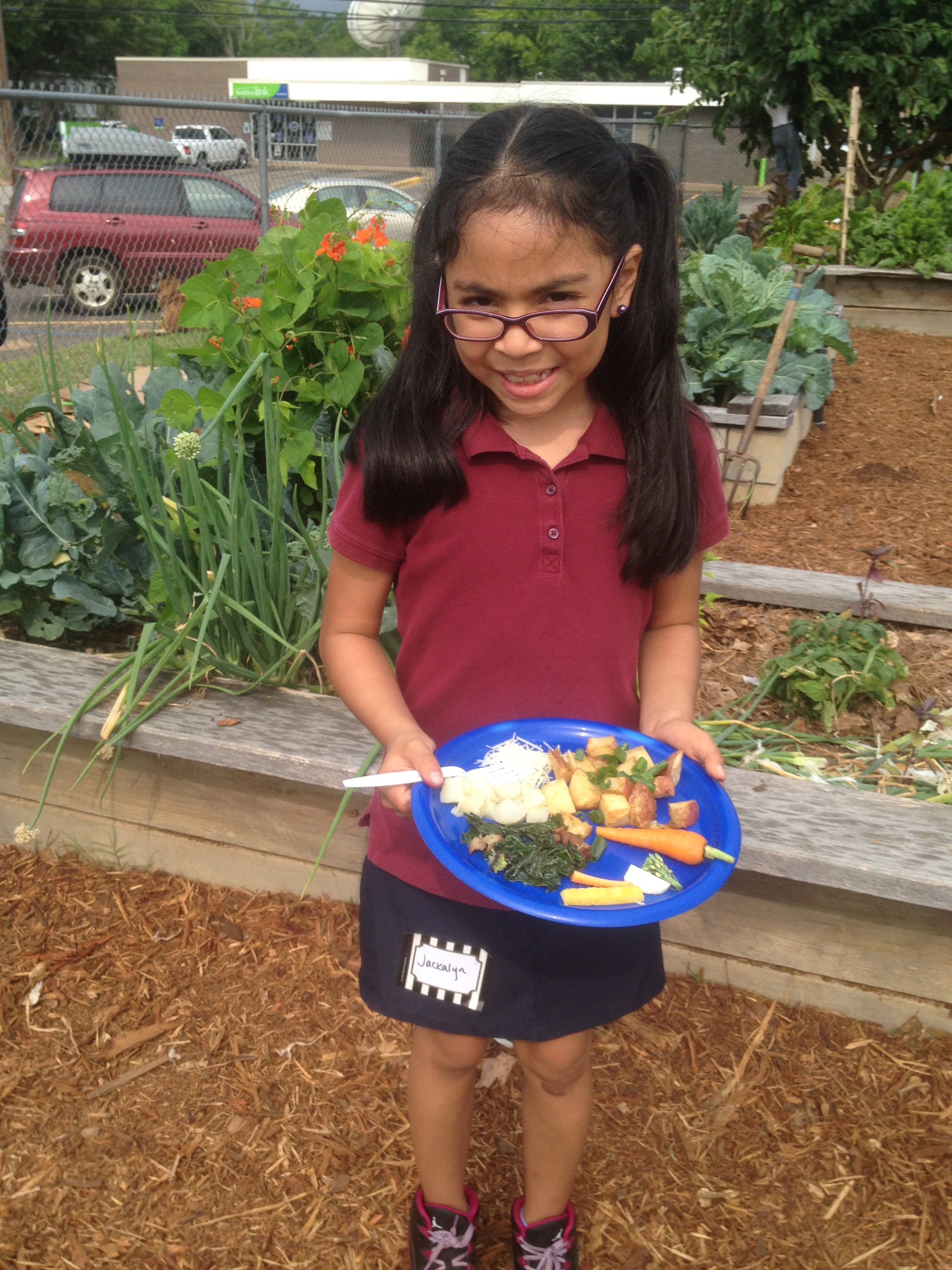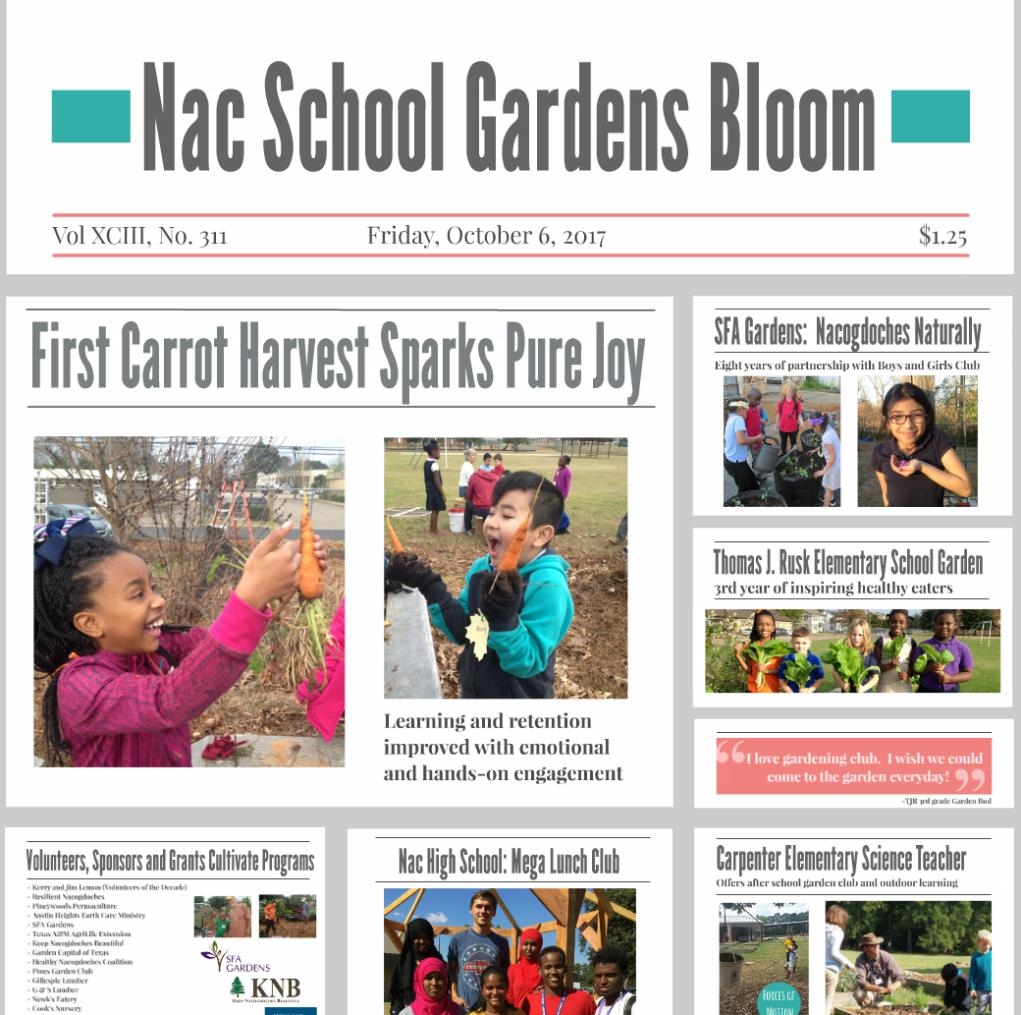School Gardens Bloom in Nacogdoches
/By Jocelyn Moore, SFA Student and Assistant Education Coordinator at SFA Gardens. Jocelyn was a student in our Fruit and Vegetable Production class.
Need a feel good minute? Watch this short & super sweet video of school gardens in Nac!
I have never seen more joy radiating from children than during their first carrot harvest. The green, frilly tops popping out of the earth give no indication that a familiar root awaits below. Almost every time I've witnessed this scene, the child tugs and unearths their prize triumphantly, waving the carrot like a trophy above their head. This story, amidst countless others unfolding weekly in our school gardens, is just one small example of how and why children are embracing fruits and vegetables. With this level of engagement, it’s easy to see why garden-based, experiential learning is a powerful tool for teaching a wide range of subjects—from science and math to nutrition and behavior—all of which can be happily gained in the fresh outdoors of the garden.
As a mother, gardener and outdoor educator for over fifteen years, my experiences have helped shape a vision I hold for the town I call home in rural East Texas. This vision involves children who understand where their food comes from, value their environment and healthy eating, and engage deeply in stimulating, hands-on education.
Roots
3rd grade Garden Bud marvels in her first carrot harvest.
At first glance, the multitude of school gardens sprouting up around our country appears to be the latest trend in foodie culture. But school gardens aren’t a fad. Sure, we see a current upswing of interest; however, educators have long seen the value of children learning in the garden.
Documented roots of school gardening date back as early as the 1840’s, as author Kate Burt explains “school gardens are a mainstay in the United States” in her article “A Complete History of the Social, Health, and Political Context of the School Gardening Movement in the United States: 1840–2014.”
Shoots
Recently, there has been an exciting movement growing in Nacogdoches. If you haven’t heard about the horticultural happenings in our schoolyards, you are in for a treat of good news. It has been a truly awesome experience to support the revitalization project at the TJR School Garden, spearheaded by two of the most amazing and dedicated volunteers I know, Jim and Kerry Lemon. Three years ago, the Lemons had a vision for the empty garden boxes sitting adjacent to the TJR soccer field. With the support of volunteers from Resilient Nacogdoches and the Austin Heights Earth Care Ministry, the couple created a weekly program serving students during their elective time.
The Lemon’s vision was fruitful and has inspired offshoots of over a dozen school and community gardens in the 2017-2019 school years. Wow!
3rd Grade TJR School Garden Buds harvest fresh mustard greens.
Moore brothers help water the Carpenter Elementary School Garden.
Last year, 3rd grade teacher Mike Moore and I reclaimed the dormant beds at Carpenter Elementary by creating an after school Gardening Club for 22 students. Fredonia Elementary and Head Start have taken off with raised beds, offering weekly vegetable gardening lessons. Brooks Quinn Jones Elementary recently received an education grant from Lowe’s. They have hit the ground running, starting their first edible garden this spring and building an outdoor classroom, Class in the Grass. At SFA Gardens, we have built a native edibles garden and playscape at the Pineywoods Native Plant Center, where we teach weekly gardening and culinary lessons to Boys and Girls Club students.
And the list is growing. There has been exponential growth this past 2017-2018, with over a dozen new school and community gardens sprouting up in this year alone.
“I love Garden Club! I wish we could come to the garden everyday!”
Fruits
Garden-based learning is integrated and so are its benefits. I have seen students who literally gag at the thought of eating kale on their first day of Garden Club who quickly become happy eaters of Every. Single. Thing. We. Grow. And yes, I’m even talking about turnips and cauliflower! Children witness the magic of tiny seeds that sprout bigger each week as they nurture their plants until they begin to recognize actual vegetables, so of course students are eager to eat the fruits of their labor. Research shows this openness to trying new foods follows students outside of the garden with an increase of daily fruits and vegetable consumption.
2nd Grader at TJR is excited to try new vegetables at the end of the season Harvest Feast.
Beyond improved eating habits and nutrition, children are expected to be team players and learn how to problem solve with their peers. Garden Buds do meaningful work with real tools; their accomplishment is reflected in their boosted self-esteem. Furthermore, children and adults alike benefit greatly from getting outside and moving throughout the day.[2]
Moving onto academics, students learn a myriad of topics with a hands-on approach. Here are few of the 3rd Grade science standards that are easy to imagine learning in the garden (did I mention outside?!):
3rd FBI (Fungi, Bacteria and Invertebrate) Agents investigate the soil for organic and inorganic matter.
Learning Science in the Garden:
- Life cycles
- Decomposition
- Weather
- Parts of a plant
- Soil and erosion
- Temperature
- Matter
- Water cycle
A children’s garden is full of learning for all ages. Volunteers and teachers often learn gardening skills right along with their students. As a bonus, volunteers develop a resilient network that cares for each other and the needs of their community.
Pollinators
Many partnerships have been formed in the school gardening movement. SFA student groups and interns have played an important role in supporting volunteer-powered programming. Nutritionist intern Nathan Slinkard taught students about cooking and healthy eating, developing recipes and nutrition games for students. Student president of the Environmental Awareness Movement (TEAM), Tom Knapp, spent a semester helping to coordinate SFA student work parties, community events, and implemented a rain catchment system at Carpenter Elementary.
Volunteers show off their hard work, building rich soil and creating pathways for Nacogdoches Naturally, an afterschool gardening club at the SFA Gardens Pineywoods Native Plant Center.
Claudann Jones, Shannon Morrison and Ashton Logsdon are All Stars at the Texas A&M AgriLife Extension, assisting in grants, workshops, consulting, and a myriad of culinary and gardening support!
Rachel Payne showing bees to visitors on her homestead. She brings an observation hive to school gardens for kids to view the bees through a class panel.
Rachel Payne, member of the Pineywoods Beekeepers Association, gives her time regularly as a special garden guest showing off bees in a mobile, handmade observation hive. Pineywoods Permaculture and Theron Beaudreau, holistic land consultant and teacher, lead workshops and service learning projects in the community about organic and holistic gardening methods.
The Healthy Nacogdoches Coalition has helped to connect these folks, and many others, together with monthly meetings. If you would like to join us for a lunch, speaker and Nac Gardens Alliance meeting, you are welcome! Please contact Jocelyn Moore at moorejv@sfasu.edu for details.
Planning for Seasons to Come
How do we ensure that these gardens and children continue to flourish? While gardeners add fertility to our beds each season to ensure future growth, how can Nacogdoches support the health and longevity of these budding programs? According to researcher Heather Ohly, who has evaluated existing literature on school gardening programs, she cites that a “lack of funding and over reliance on volunteers” has been a hindrance to long-term viability of these programs…” We’ve seen first-hand in the short history of school gardening in Nacogdoches that teacher, volunteer, and grant-based programs evaporate once those key people are no longer involved. School gardening volunteers advocate for the importance of paid coordinator positions at the elementary, middle and high school levels to guarantee longevity of the volunteer-driven programs.
“School Gardening Coordinators ensure gardening programs are integrated into daily curriculum and provide continuity throughout grade levels and staff turnovers.”
SFA Phi Delta Theta worked hard this fall to revamp the beds at Carpenter Elementary.
There’s plenty of research that illustrates the power in garden-based learning: improved nutrition, physical activity, behavior and academic outcomes. But nothing beats seeing it before your own eyes. If you’d like to support the ongoing efforts of the Nac Gardens Alliance by volunteering, fundraising, and/or connecting with city officials, please email Jocelyn Moore at moorejv@sfasu.edu. We also host seasonal work parties: a great way to get exercise, meet new folks, learn something new and serve your community!
To see more photos and inspiration, check out a presentation I shared with the Healthy Nacogdoches Coalition.
A Tremendous THANK YOU to Volunteers and Grantors!
Resilient Nacogdoches
Pineywoods Permaculture
SFA Gardens
Healthy Nacogdoches Coalition
Keep Nacogdoches Beautiful
Texas A&M AgriLife Extension
Austin Heights Baptist Church Earth Care Ministry
SFA Phi Delta Theta
SFA TEAM (The Environmental Awareness Movement)
Pine Garden Club
Lowe's Toolbox for Education
Works Cited:
Full, topical bibliography compiled by Emory University graduate student and Nacogdoches School Garden Alliance volunteer Jordan Johnson.
Burt, Kate Gardner. “A Complete History of the Social, Health, and Political Context of the School Gardening Movement in the United States: 1840–2014.” Journal of Hunger and Environmental Nutrition. Vol. 11, No. 3. 2016
Berezowitz, Claire K. et al. “School Gardens Enhance Academic Performance and Dietary Outcomes in Children.” Journal of School Health. Vol. 85, No. 8. August 2015
Louv, Richard. “Last Child in the Woods: Saving Our Children From Nature-Deficit Disorder.” 2005
Ohly, Heather et al. “A systematic review of the health and well-being impacts of school gardening: synthesis of quantitative and qualitative evidence.” BMC Public Health. Vol. 16, No. 286. 2016.













